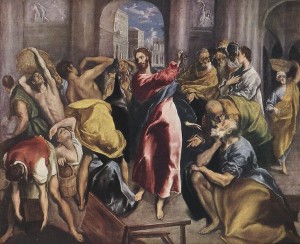What Would Jesus Do at Christmas?
America’s widening gap between rich and poor is especially noticeable at Christmastime when the rich shower themselves with extravagant gifts and assuage their self-images by donating a few turkeys and a toy or two to the poor, a tradition that troubles Rev. Howard Bess.
By the Rev. Howard Bess
A turkey given to a poor person or family at Thanksgiving or Christmas is the great symbol of American generosity. The gifts of turkeys to the needy and toys for their children are given great publicity. Newspapers are full of pictures of smiling children and grateful women who have fallen on hard times.
Editors are quick to write glowing editorials about American generosity and heap praise on the well-to-do who support these charities. Add a bell ringer and a metal bucket at the door of every grocery store and the feel-good season for the “haves” is complete.
But the turkeys and toys programs are an embarrassment to the poor, and poor kids grow up in shame for their poverty. Yet, one of the complaints against poor people is that some are not grateful enough for these charities and some even abuse the give-away by getting in line at more than one distribution point.
A related complaint about Jesus was that he hung out too much with poor people and with those deemed dirty and unclean. Almost all his followers were peasants and expendables.
Many Christian churches try to make Jesus out to be middle-class and present him as a skilled, respected tradesman. But the truth is that he was not. His status as some sort of handyman put him between peasantry and being an expendable. He did not just hang out with the poor, he was one of them.
Jesus was a dangerous man because he had figured out how peasants got that way. Many of the stories that he told were told to start discussions about what rich people were doing to them. One such story is recorded in Matthew Chapter 20. It is about the relationship between a rich landowner and day laborers.
The traditional interpretation of the parable is that the owner is a God figure and casts the laborers as ungrateful, grumbling sinners. This is a theological interpretation that is now questioned by a growing number of scholars.
The key to understanding the parable is to ask what the peasant audience of Jesus heard. If read as social commentary from that perspective, the rich owner is an unscrupulous man who had acquired the land by dishonesty, manipulation and greed. To the ears of the peasants and the disposables who listened to Jesus, the man was a hated owner who manipulated their lives and left them in unbearable poverty.
When the laborers of the story began grumbling among themselves about the business practices of the rich owner, the man took charge of the conversation and lectured the laborers. “Take what belongs to you and go; I choose to give to this last as I give to you. Am I not allowed to do what I choose with what belongs to me? Or do you begrudge my generosity?”
The response of the rich owner in the story takes away the possibility of making him a loving God figure. He is plainly an arrogant rich man who believed his ownership gave him the right to set the rules of the relationship of owners and laborers.
Our modern American economy parallels the economy of Jesus’s day. The gap between rich and poor is wide and growing wider, with an arrogant upper class that lives apart from the poor. The rich have gained enormous wealth through manipulation and the misuse of laborers.
The poor beg for a livable wage, a decent house to live in, good education and basic health care. The rich pit the poor against one another and continue to pay poverty wages. But rich people and those who have more than enough also want to look good, so at this time of year, they proclaim: “Let’s give the destitute turkeys and toys.”
The message of this column will not be popular. I can hear the plea of the “givers”: “Are you criticizing our generosity?” My response is “No, I am suggesting there is a better way.”
When the minimum wage is a living wage, when we have excellent education for all, when every American is decently housed, and when every American has access to good health care, the turkey-and-toy giveaway will no longer be needed – and self-esteem will soar.


No comments:
Post a Comment